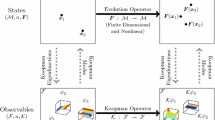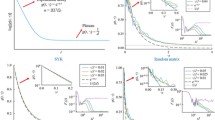Abstract
The classical fluctuation-dissipation theorem predicts the average response of a dynamical system to an external deterministic perturbation via time-lagged statistical correlation functions of the corresponding unperturbed system. In this work we develop a fluctuation-response theory and test a computational framework for the leading order response of statistical averages of a deterministic or stochastic dynamical system to an external stochastic perturbation. In the case of a stochastic unperturbed dynamical system, we compute the leading order fluctuation-response formulas for two different cases: when the existing stochastic term is perturbed, and when a new, statistically independent, stochastic perturbation is introduced. We numerically investigate the effectiveness of the new response formulas for an appropriately rescaled Lorenz 96 system, in both the deterministic and stochastic unperturbed dynamical regimes.







Similar content being viewed by others
Notes
The author privately communicated that his response formula applies to a perturbation noise in the Stratonovich form.
References
Abramov, R.V.: Short-time linear response with reduced-rank tangent map. Chin. Ann. Math. 30B(5), 447–462 (2009)
Abramov, R.V.: Approximate linear response for slow variables of deterministic or stochastic dynamics with time scale separation. J. Comput. Phys. 229(20), 7739–7746 (2010)
Abramov, R.V.: Improved linear response for stochastically driven systems. Front. Math. China 7(2), 199–216 (2012)
Abramov, R.V.: A simple linear response closure approximation for slow dynamics of a multiscale system with linear coupling. Multiscale Model. Simul. 10(1), 28–47 (2012)
Abramov, R.V.: Suppression of chaos at slow variables by rapidly mixing fast dynamics through linear energy-preserving coupling. Commun. Math. Sci. 10(2), 595–624 (2012)
Abramov, R.V.: A simple closure approximation for slow dynamics of a multiscale system: nonlinear and multiplicative coupling. Multiscale Model. Simul. 11(1), 134–151 (2013)
Abramov, R.V.: Linear response of the Lyapunov exponent to a small constant perturbation. Commun. Math. Sci. 14(4), 1155–1167 (2016)
Abramov, R.V.: A simple stochastic parameterization for reduced models of multiscale dynamics. Fluids 1(1), 2 (2016)
Abramov, R.V., Kjerland, M.: The response of reduced models of multiscale dynamics to small external perturbations. Commun. Math. Sci. 14(3), 831–855 (2016)
Abramov, R.V., Majda, A.J.: Blended response algorithms for linear fluctuation-dissipation for complex nonlinear dynamical systems. Nonlinearity 20, 2793–2821 (2007)
Abramov, R.V., Majda, A.J.: New approximations and tests of linear fluctuation-response for chaotic nonlinear forced-dissipative dynamical systems. J. Nonlinear Sci. 18(3), 303–341 (2008)
Abramov, R.V., Majda, A.J.: New algorithms for low frequency climate response. J. Atmos. Sci. 66, 286–309 (2009)
Bell, T.: Climate sensitivity from fluctuation dissipation: some simple model tests. J. Atmos. Sci. 37(8), 1700–1708 (1980)
Birkhoff, G.D.: Proof of the ergodic theorem. Proc. Natl. Acad. Sci. USA 17(12), 656–660 (1931)
Carnevale, G., Falcioni, M., Isola, S., Purini, R., Vulpiani, A.: Fluctuation-response in systems with chaotic behavior. Phys. Fluids A 3(9), 2247–2254 (1991)
Cohen, B., Craig, G.: The response time of a convective cloud ensemble to a change in forcing. Q. J. R. Meteorol. Soc. 130(598), 933–944 (2004)
Eckmann, J.-P., Ruelle, D.: Ergodic theory of chaos and strange attractors. Rev. Mod. Phys. 57(3), 617–656 (1985)
Evans, D., Morriss, G.: Statistical Mechanics of Nonequilibrium Liquids. Academic Press, New York (1990)
Gikhman, I.I., Skorokhod, A.V.: Introduction to the Theory of Random Processes. Courier Dover Publications, New York (1969)
Gikhman, I.I., Skorokhod, A.V.: The Theory of Stochastic Processes I. Classics in Mathematics. Springer, New York (2004)
Gritsun, A.: Fluctuation-dissipation theorem on attractors of atmospheric models. Russ. J. Numer. Math. Model. 16(2), 115–133 (2001)
Gritsun, A., Branstator, G.: Climate response using a three-dimensional operator based on the fluctuation-dissipation theorem. J. Atmos. Sci. 64, 2558–2575 (2007)
Gritsun, A., Branstator, G., Dymnikov, V.: Construction of the linear response operator of an atmospheric general circulation model to small external forcing. Numer. Anal. Math. Model. 17, 399–416 (2002)
Gritsun, A., Branstator, G., Majda, A.J.: Climate response of linear and quadratic functionals using the fluctuation dissipation theorem. J. Atmos. Sci. 65, 2824–2841 (2008)
Gritsun, A., Dymnikov, V.: Barotropic atmosphere response to small external actions. Theory and numerical experiments. Atmos. Ocean Phys. 35(5), 511–525 (1999)
Itô, K.: Stochastic integral. Proc. Imp. Acad. Tokyo 20, 519–524 (1944)
Itô, K.: On stochastic differential equations. Mem. Am. Math. Soc. 4, 1–51 (1951)
Kubo, R.: Statistical mechanical theory of irreversible processes I: general theory and simple applications to magnetic and conduction problems. J. Phys. Soc. Jpn. 12, 507–586 (1957)
Kubo, R.: The fluctuation-dissipation theorem. Rep. Prog. Phys. 29, 255–284 (1966)
Kubo, R., Toda, M., Hashitsume, N.: Statistical Physics II: Nonequilibrium Statistical Mechanics. Springer, New York (1985)
Kunita, H.: Stochastic Flows and Stochastic Differential Equations. Cambridge University Press, Cambridge (1997)
Leith, C.: Climate response and fluctuation-dissipation. J. Atmos. Sci. 32, 2022–2025 (1975)
Lorenz, E.: Predictability: a problem partly solved. In: Proceedings of the Seminar on Predictability, ECMWF, Shinfield Park, Reading, England (1996)
Lorenz, E., Emanuel, K.: Optimal sites for supplementary weather observations. J. Atmos. Sci. 55, 399–414 (1998)
Lucarini, V.: Stochastic perturbations to dynamical systems: a response theory approach. J. Stat. Phys. 146, 774–786 (2012)
Lucarini, V., Sarno, S.: A statistical mechanical approach for the computation of the climatic response to general forcings. Nonlinear Process. Geophys. 18, 7–28 (2011)
Majda, A.J., Abramov, R.V., Gershgorin, B.: High skill in low frequency climate response through fluctuation dissipation theorems despite structural instability. Proc. Natl. Acad. Sci. USA 107(2), 581–586 (2010)
Majda, A.J., Abramov, R.V., Grote, M.J.: Information theory and stochastics for multiscale nonlinear systems, vol 25 of CRM Monograph Series of Centre de Recherches Mathématiques, Université de Montréal. American Mathematical Society (2005). ISBN 0-8218-3843-1
Øksendal, B.: Stochastic Differential Equations: An Introduction with Applications. Universitext, 6th edn. Springer, New York (2010)
Pavliotis, G.: Stochastic Processes and Applications. Texts in Applied Mathematics, vol. 60. Springer, New York (2014)
Risken, H.: The Fokker-Planck Equation, 2nd edn. Springer, New York (1989)
Ruelle, D.: Differentiation of SRB states. Commun. Math. Phys. 187, 227–241 (1997)
Ruelle, D.: General linear response formula in statistical mechanics, and the fluctuation-dissipation theorem far from equilibrium. Phys. Lett. A 245, 220–224 (1998)
Ruelle, D.: Nonequilibrium statistical mechanics near equilibrium: computing higher order terms. Nonlinearity 11, 5–18 (1998)
Young, L.-S.: What are SRB measures, and which dynamical systems have them? J. Stat. Phys. 108(5–6), 733–754 (2002)
Acknowledgements
The work was supported by the Office of Naval Research Grant N00014-15-1-2036.
Author information
Authors and Affiliations
Corresponding author
Rights and permissions
About this article
Cite this article
Abramov, R.V. Leading Order Response of Statistical Averages of a Dynamical System to Small Stochastic Perturbations. J Stat Phys 166, 1483–1508 (2017). https://doi.org/10.1007/s10955-017-1721-2
Received:
Accepted:
Published:
Issue Date:
DOI: https://doi.org/10.1007/s10955-017-1721-2




